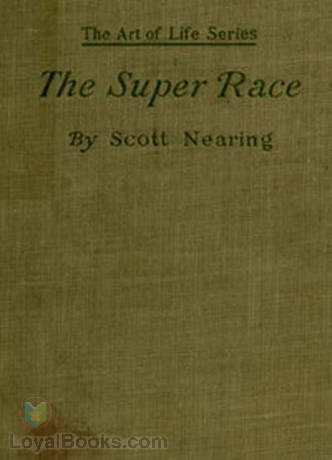The Super Race: An American Problem By: Scott Nearing (1883-1983) |
|---|

Scott Nearing’s The Super Race: An American Problem delves into the complex and controversial topic of racial purity and discrimination in America during the early 20th century. Spanning a wide range of subjects such as eugenics, immigration, and social hierarchy, Nearing’s thought-provoking analysis urges readers to confront uncomfortable truths about the country's historical treatment of racial minorities.
The book begins by exploring the concept of eugenics, a movement that gained popularity in the early 1900s, which aimed to improve the genetic quality of the human population. Nearing skillfully traces the development and influence of eugenics, shedding light on how this pseudoscience played a significant role in shaping policies and societal attitudes.
One of the book's achievements lies in its meticulous examination of immigration policies and their impact on the American population. Nearing highlights the social unrest and divisive rhetoric surrounding the influx of immigrants, ultimately leading to discriminatory practices that aimed to maintain a perceived racial purity.
The author does not shy away from discussing sensitive topics, skillfully dissecting the arguments that were used to promote discriminatory practices and systematically exclude minority groups from the American Dream. Nearing’s analysis offers valuable insight into the historical context of racial tensions that continue to plague the United States today.
Furthermore, Nearing’s thorough research and extensive use of primary sources add credibility to his assertions, making the book a valuable resource for scholars and researchers interested in the history of racial discrimination. Unfortunately, the absence of a comprehensive bibliography may limit readers' ability to explore further on some of the specific sources Nearing refers to.
Perhaps one of the book's flaws lies in its occasionally dense and repetitive style, which may challenge casual readers or those unfamiliar with the historical context. While Nearing's arguments are sound, the presentation may occasionally hinder the book's accessibility. However, for those with a keen interest in the subject matter, the depth of analysis and intellectual rigor will undoubtedly prove rewarding.
In conclusion, Scott Nearing’s The Super Race: An American Problem is a meticulously researched and thought-provoking exploration of the historical factors that contributed to racial discrimination and the notion of racial purity in America. Nearing's ability to shed light on complex and uncomfortable truths invites readers to critically reflect on the troubled legacy of racial inequality in the country. Despite a few minor drawbacks, this book stands as an essential read for anyone seeking to deepen their understanding of the intricacies surrounding race relations in early 20th century America. The Super Race THE ART OF LIFE SERIES Edward Howard Griggs, Editor The Super Race AN AMERICAN PROBLEM BY SCOTT NEARING, Ph.D. WHARTON SCHOOL, UNIVERSITY OF PENNSYLVANIA AUTHOR OF "SOCIAL ADJUSTMENT," ETC. NEW YORK B. W. HUEBSCH 1919 Copyright, 1912, by B. W. HUEBSCH First printing, May, 1912 Second printing, May, 1919 PRINTED IN U. S. A. TO THE MOTHERS AND FATHERS OF THE SUPER RACE FOREWORD For ages men have sought to perpetuate their memories in enduring monuments of brass and of stone. Yet, in their efforts to build lasting memorials they have neglected the most enduring monument of all the Monument of Posterity. These farseeing ones have overlooked their real opportunity; for in posterity in the achievements of their children's children, men may best hope to reflect a lasting greatness. CONTENTS CHAPTER PAGE I THE CALL OF THE SUPER RACE 13 II EUGENICS THE SCIENCE OF RACE CULTURE 26 III SOCIAL ADJUSTMENT THE SCIENCE OF MOLDING INSTITUTIONS 44 IV EDUCATION THE SCIENCE OF INDIVIDUAL DEVELOPMENT 55 V THE AMERICAN OPPORTUNITY 75 The Super Race CHAPTER I THE CALL OF THE SUPER RACE As a very small boy, I distinctly remember that stories of the discovery of America and Australia, of the exploration of Central Africa and of the invention of the locomotive, the steamboat, and the telegraph made a deep impression on my childish mind; and I shall never forget going one day to my mother and saying: "Oh, dear, I wish I had been born before everything was discovered and invented... Continue reading book >>
|
| eBook Downloads | |
|---|---|
|
ePUB eBook • iBooks for iPhone and iPad • Nook • Sony Reader |
Kindle eBook • Mobi file format for Kindle |
|
Read eBook • Load eBook in browser |
Text File eBook • Computers • Windows • Mac |
| Review this book |
|---|